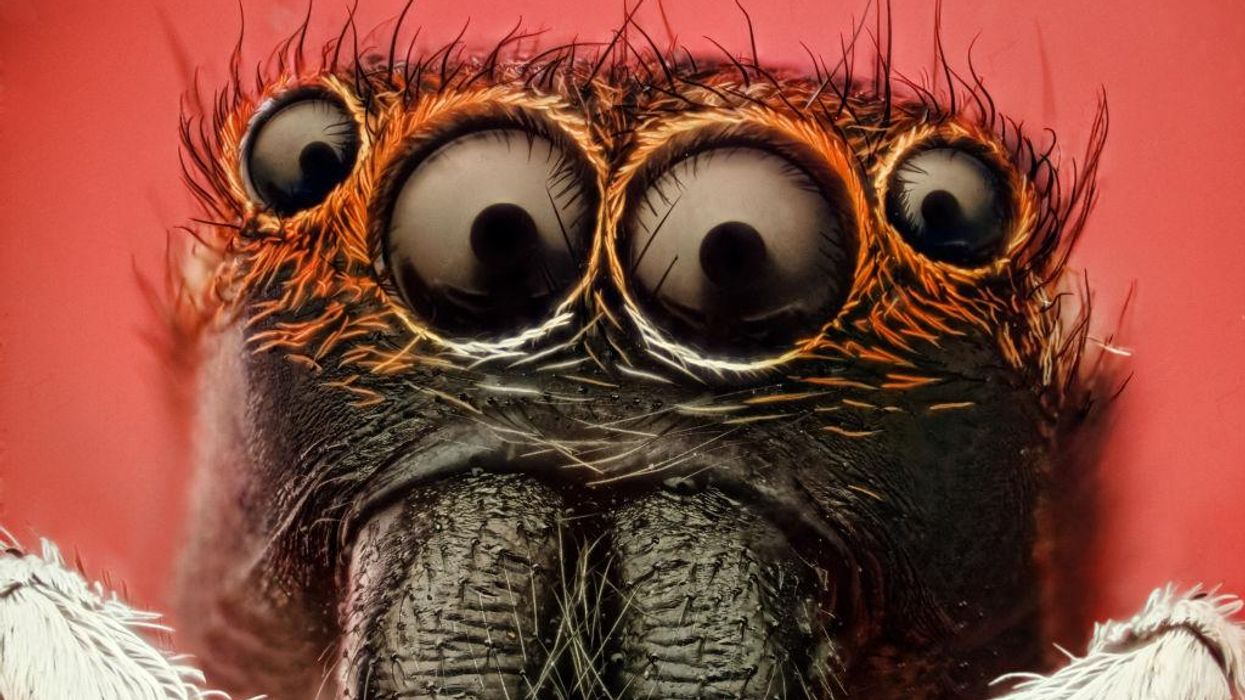
Javier Torrent /VW PICS/Universal Images Group via Getty Images

The jumping spider is something of an internet sensation. Each about the size of a fingernail, these eight-legged acrobats are widely loved for their big eyes, furry bodies, and colorful features.
They come in more than 5,000 varieties, have terrific vision and enthralling mating dances, and can leap up to 50 times their own body length.
But did you know that scientists think these tiny spiders may have big dreams?
A recent study from German, Italian, and U.S. researchers reports scientists observed that jumping spiders experience a sleep state resembling rapid eye movement sleep.
In humans, REM sleep is when your brain activity spikes and your muscles relax to the point where you are immobilized, while your eyes may dart around quickly. People tend to experience their most vivid dreams at this stage of the sleep cycle.
Daniela C. Roessler, a behavioral ecologist with the University of Konstanz in Germany, observed that jumping spiders appeared to exhibit sleep behaviors that resemble REM sleep in other species.
At night, the spiders hung from small silk threads and suspended motionless. But Roessler also noticed that sometimes the spiders would twitch or curl their legs, and even their eyes appeared to move.
The movements reminded researchers of how sleeping dogs or cats might sometimes twitch and jerk.
\u201cWhile filming hanging jumping spiders at night, we noticed surprising things happening. Regular phases of curling up their legs and twitching in what seemed like uncontrolled movements. Reminding us a lot of sleeping dogs or cats, we asked: could this be REM sleep? 2/7\u201d— Dr. Daniela R\u00f6\u00dfler \ud83c\udf0e (@Dr. Daniela R\u00f6\u00dfler \ud83c\udf0e) 1659986161
According to the study, which was published in the Proceedings of the National Academy of Sciences, the researchers examined baby jumping spiders, which have translucent exoskeletons, to learn what was happening to their bodies in this sleep state. They discovered that the spiders' retinas were moving along with their twitching and leg curling.
\u201cAnd indeed, we found the same phases of twitching and leg curling AND every time that happened, the retinas were moving!!!\ud83d\ude2e 4/7\u201d— Dr. Daniela R\u00f6\u00dfler \ud83c\udf0e (@Dr. Daniela R\u00f6\u00dfler \ud83c\udf0e) 1659986161
"Does this mean spiders dream? We do not know. But the possibility is exhilarating," Roessler tweeted on Aug. 8. "I want to thank a dream team of researchers for starting this wild journey with me. And also three great reviewers! I can’t wait to continue my research on this for the next couple of years."
In an interview with NPR, Roessler explained that it's too early to say whether the spiders are actually "asleep" while having these rapid eye movements. The scientists will next be testing whether the spider behavior they observed meets the definition of sleep.
As for whether or not they dream, Roessler said it was too early to say and that a spider's dreams wouldn't be anything like what humans dream about.
"I mean, it's beautiful to think about it that way, that these spiders hang there and they have a visual scene of catching a fly or trying to get a mate," she told NPR. "It's quite cute, but probably is going to be very different."